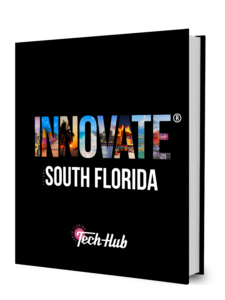Providing Independence for the Blind & Visually Impaired
TECH DOING GOOD

Lighthouse for the Blind of the Palm Beaches is a 501 (c )(3)non-profit organization committed to empowering individuals ages 0-expiration who are blind or visually impaired by providing essential services and support. Since its establishment in 1946, its mission has been to enhance the quality of life and promote independence for their clients through a variety of specialized programs and advocacy efforts.
Embracing assistive technology (AT), vocational rehabilitation and personalized assessments empowers individuals who are blind or have low vision. Through the integration of innovative tools and individualized strategies, the Lighthouse has made remarkable progress in fostering independence and improving the quality of life for those with visual impairments.

Grasping the Impact of Visual Impairments
Visual impairments vary widely, from partial sight to total blindness. Low vision refers to limited sight that cannot be corrected with traditional methods, while blindness means a complete lack of visual perception. Conditions like macular degeneration, glaucoma, diabetic retinopathy, and cataracts are common causes of vision loss. These impairments can significantly impact daily activities such as reading, writing, and navigating their environment, making adaptive technologies vital for maintaining independence.
The Lighthouse Provides Tailored Assessments to Address Unique Needs
A key aspect of empowering those with visual impairments is by providing a thorough and individualized assessment process. Understanding the unique needs of each person allows the Lighthouse professionals to recommend the most effective assistive technology. Medical professionals collaborate by assessing functional vision through techniques like evaluating visual acuity (sharpness), visual field (the area visible without moving the eyes), contrast sensitivity (ability to distinguish objects from their background), and visual perception (interpretation of visual information) to identify the most suitable tools for mobility, communication, and daily tasks.
Every person’s vision loss and goals are unique, so customized technology recommendations are essential for maximizing independence and improving quality of life.
Empowering Mobility, Communication, and Daily Life with Assistive Technology
Assistive technology offers a wide range of solutions to enhance the lives of those with visual impairments. For mobility, aids such as long canes, electronic mobility tools, and guide dogs help individuals navigate safely. GPS navigation systems also provide audio directions for unfamiliar areas, ensuring greater autonomy.
Visual aids such as magnifying glasses, closed-circuit television (CCTV) systems, and large-print materials help with reading and viewing objects. Braille readers and writers, talking clocks, and voice-activated assistants are essential for communication, enabling individuals to stay informed and connected. Adaptive devices like talking measuring cups and tactile labels allow for independent cooking, while smart home technology simplifies tasks like controlling lighting or adjusting temperature.
For computer access, screen readers like JAWS (Job Access With Speech)and magnification software such as ZoomText and SuperNova enable users to interact with digital platforms. Smartphones and smartphone apps like Be My Eyes and OrCam My Eye connect users with volunteers or read text aloud, offering real-time assistance on the go.

Boosting Independence with Tailored Training and Support
While access to technology is crucial, effective training and ongoing support are essential for success. A user-centered training approach customizes technology to each person’s specific needs and preferences, ensuring they are equipped to operate their devices confidently.
These tailored training sessions also foster greater independence by building essential skills for navigating the world. In addition, addressing psychological and social aspects, such as self-esteem and emotional resilience, can positively influence how individuals embrace new technology. Ethical considerations—such as respecting privacy, autonomy, and informed consent—are paramount when introducing these technologies into a person’s life.

A Future of Independence and Fulfillment
With assistive technology, vocational rehabilitation and thoughtful assessments, individuals who are blind or have low vision can lead independent, fulfilling lives. Tools like smartphones, the BrailleNote TouchPlus, Victor Reader Stream, and ZoomText help users complete everyday tasks, while smart home technology and voice assistants like Amazon Alexa provide ease of control over their environments.
As technology continues to evolve, the future is bright for individuals with visual impairments. Through continued innovation and personalized support from the Lighthouse for the Blind of the Palm Beaches, they will continue to lead independent lives, engage with the world, and pursue their dreams without limitations.

















